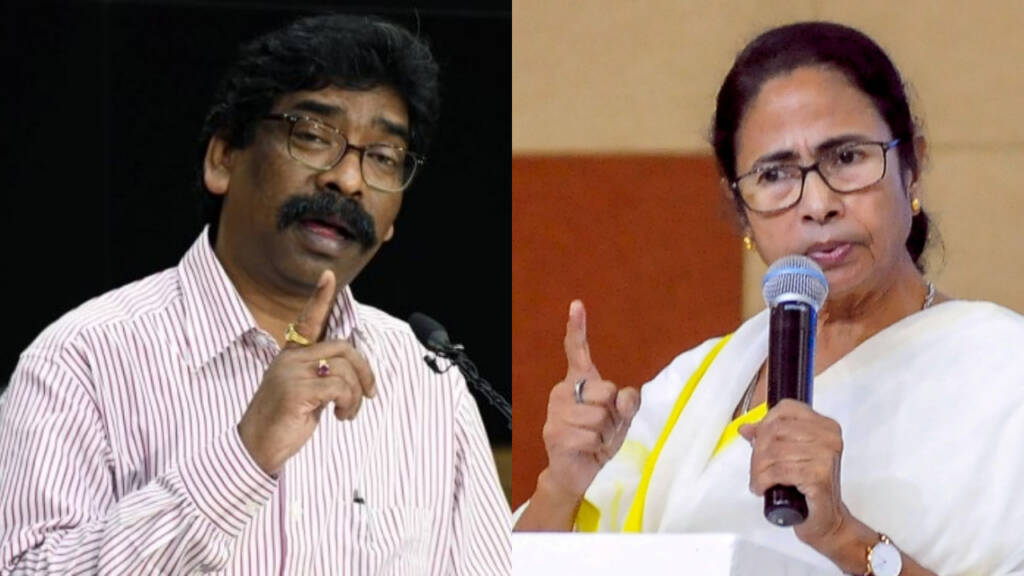Jharkhand Mukti Morcha (JMM) – the Jharkhand based party that primarily banks on tribal votes, has announced that it will contest in upcoming West Bengal Assembly Elections. Hemant Soren, the Chief Minister of Jharkhand, announced that the party will contest elections in Vrihat Jharkhand, which means the districts in neighbouring states like West Bengal and Odisha which are dominated by tribal population.
Soren’s party said that the decision on whether to fight the election in alliance with like-minded parties or alone will be taken after the mega-rally in Jhargram district that is scheduled on January 28. The entry of JMM and the Soren factor is probably Mamata Banerjee’s attempt to weaken BJP in the Western region of West Bengal- an area dominated by tribal and OBC population- where BJP has performed excellently in the last few years. The saffron party won all the seats of the Western Region in the 2019 general election.
The attempt of TMC to weaken BJP in the region is set to fall flat on its face because JMM’s success in Jharkhand cannot be repeated in West Bengal due to various reasons. In Jharkhand, BJP lost due to ineffective leadership of Raghubar Das, the allegation of corruption of senior party leaders, not bringing a tribal as CM candidate in the state-dominated by tribal population and massive party infighting. Such factors led to Hemant Soren becoming the new CM of Jharkhand.
Read More: TMC admits that it cannot beat the BJP alone
The vote percentage of the party remained above 31 per cent and it won a large number of seats. The party lost in the state because people were not willing to see Raghubar Das as Chief Minister for another term and Soren utilised the opportunity. Soren crafted alliances with Congress and RJD, thus combining opposition votes against BJP.
However, in West Bengal, none of these factors is going to work for JMM. Soren enjoys little support in tribal-dominated districts of West Bengal.
In Bengal, BJP’s prime voter base consists of OBCs, SC, and STs. Riding on popularity in these communities; the party managed to win 18 seats out of 42 in the 2019 general elections in West Bengal. The constituencies that the party majorly won in 2019 were rural– primarily in the Western and Northern regions of the state and bringing them to vote for Soren’s party JMM won’t be easy.
Since the early 2010s, RSS has been tirelessly working in the state, especially in the OBC and ST dominated areas. Dilip Ghosh, the current President of West Bengal BJP who was appointed in 2015, comes from Sadgop caste and is from Jungle Mahal region of West Bengal.
The party has performed excellently in both 2016 assembly elections and 2019 general elections since Ghosh was appointed as the President in the region. In the 2019 general elections, the party won 40.64 per cent votes in the state- only 3 per cent less than that of TMC. As in both the elections, the party gave tickets to many Hindu OBCs, who have been traditionally ignored by all three mainstream parties of the state, Mamata’s plan to loop Hemant Soren wouldn’t succeed.
The politics of West Bengal has always been dominated by Bhadralok Community, which constitutes three upper castes- Brahmin, Baidya, and Kayastha. These castes account for just 20 per cent of the state’s total population. But, all the CMs of the state– whether of CPM, Congress, or TMC– have been from the Bhadralok community. OBCs, SCs, and STs never had a say in the politics of Bengal. And this was because the Communist Party never recognised the role of caste in social upliftment.
Given the fact that BJP had first given voice to the SC, ST, and OBC communities of West Bengal, the community is going to trust the saffron party and the plan of Mamata Banerjee to loop Hemant Soren and JMM into the fray are set to fall flat.
